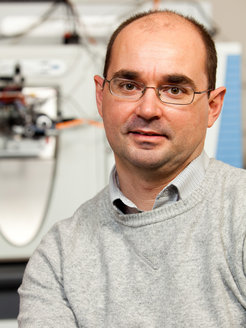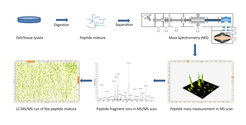Boris Macek
Quantitative Proteomics/Mass Spectrometry/Proteogenomics
University of Tübingen
Faculty in: IMPRS

Vita
- Diploma in Molecular Biology 1999, University of Zagreb
- PhD work 1999-2003 at the Institute for Medical Physics and Biophysics, University of Münster
- Postdoctoral training at the University of Southern Denmark (Odense) and Max Planck Institute for Biochemistry (Martinsried)
- Professor at the University of Tübingen since 2008
Research Interest
Current experimental workflows in proteomics, based on biochemical proteome pre-fractionation, high accuracy MS and downstream bioinformatics are capable of reliably identifying and quantifying expression levels of several thousand proteins in a single experiment, approaching the depth of message-based assays (transcriptome) and reaching the analytical capacity to completely map and quantify the smaller proteomes, such as that of bacteria and yeasts. We have developed several approaches based on stable isotope labeling to perform comprehensive studies of proteome, phosphoproteome and acetylome dynamics in model microorganisms such as B. subtilis, E. coli and S. pombe (1-3). We are currently applying these approaches to study bacterial persistence, one of the major mechanisms of multidrug tolerance (4). In course of this project, we have for the first time applied “dynamic stable isotope labeling by amino acids in cell culture (SILAC)” for measurements of protein turnover in bacterial persister cells, an approach that can be easily adapted for similar studies in senescent cancer cells.

Available PhD Projects
- Currently not recruiting PhD students via the IMPRS
Selected Reading
- Macek B, Forchhammer K, Hardouin J, Weber-Ban E, Grangeasse C, Mijakovic I. (2019) Protein post-translational modifications in bacteria. Nat Rev Microbiol. 17(11):651–664
- Ravikumar V, Nalpas NC, Anselm V, Krug K, Lenuzzi M, Šestak MS, Domazet-Lošo T, Mijakovic I, Macek B. (2018) In-depth analysis of Bacillus subtilis proteome identifies new ORFs and traces the evolutionary history of modified proteins. Sci Reports 8(1):17246
- Carpy A, Krug K, Graf S, Koch A, Popic S, Hauf S, Macek B. (2014) Absolute proteome and phosphoproteome dynamics during the cell cycle of fission yeast. Mol Cell Proteomics 13(8):1925-36
- Semanjski M, Germain E, Bratl K, Kiessling A, Gerdes K, Macek B. (2018) The kinases HipA and HipA7 phosphorylate different substrate pools in Escherichia coli to promote multidrug tolerance. Science Signaling 11, eaat5750

